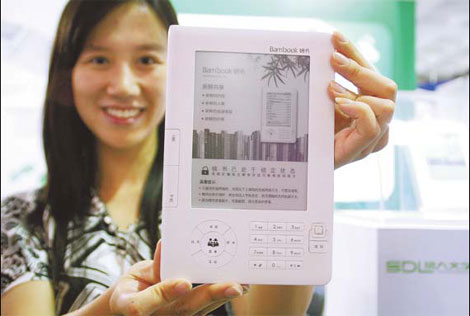Focus
Bookstores face an unhappy ending
By Zhang Yuchen (China Daily)
Updated: 2010-09-08 07:25
 |
Large Medium Small |
|
A saleswoman demonstrates an e-book in an electronics shop this month in Beijing. Wu Changing / for China Daily |
Liu Suli, who owns the popular Wansheng Bookstore in Beijing, said he and another shop owner last year spent days locked in negotiations over pricing with executives from Amazon and Dangdang, two of China's major online book outlets. The parties were unable to reach a deal.
"The costs for running a real bookstore are far more than one online," said Liu, who like others across China has seen rental charges at least triple since the early 2000s. "We just can't compete with them on price."
In March this year, three publishing associations issued the price-fixing management order, which banned traders from selling books at lower than 85 percent of the cover price within the first year of publication.
The order was rescinded just six months later as it violated the anti-monopoly regulations under Chinese law.
"The order was useless even when it was introduced," said the owner of a small independent bookstore in Guangzhou who did not want to be identified. "There were no punishments and no enforcement."
The introduction of e-books has also impacted the market, with more than 7 million e-readers sold on the Chinese mainland last year, said officials with the State Council's Information Office.
Ou Weijie, a senior consultant with the China National Publications Import and Export Corporation, said he believes devices like Amazon's Kindle and Samsung's Papyrus are just passing fads.
"E-books don't offer the real feeling of reading," argued the 50-year-old. "Generations born in the 1980s and 1990s may like this technology but when they get older, say 40 or so, they will return to paper books."
Offering alternatives
If diversity is the key to survival for traditional bookstores, then Huang Jieting, manager of Tangning Bookstore, is already on the right track.
Her shop, which opened about eight years ago and is now one of the most famous in Guangzhou, sells a mixture of creative goods alongside its books, while about 70 percent is used to display a range of artworks.
"Running a bookstore is more complicated than before," she said. "Before you just had to put books on shelves. Today, there is far more to worry about."
Huang has also used various Internet activities to boost the store's reputation. Members of its Web forums and book clubs are also invited to regular movies screenings at its premises downtown in the city's CITIC Square.
"Bookstores are like cultural landmarks," added the manager. "That's their true value."
However, for every modernist like Huang there is a traditionalist like Chen Dingfang, owner of Xooyou Bookstore, the second largest private bookstore in Guangzhou. She said she believes truly loyal readers will stick by the traditional bookstore for the love of books and the atmosphere.
Qu Huazhong at Red Leaf Bookstore agreed. His shop at the moment sells only one thing other than books - and that is bookmark.
"I just want to provide the original service of selling high-quality books. Online stores will never be able to communicate with the readers like we do," said the businessman, who opened his 20-square-meter shop in 1998.
"I'm dreaming of opening a larger store where my readers can enjoy reading while drinking coffee. That's the true meaning of a bookstore," he added.
